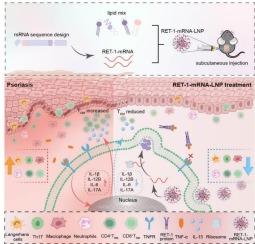新的TNF-α靶向mRNA疗法通过抑制IL-15-TRM信号传导,持续治疗银屑病并预防复发
IF 11.5
1区 医学
Q1 CHEMISTRY, MULTIDISCIPLINARY
引用次数: 0
摘要
牛皮癣是一种自身免疫性皮肤病,严重损害患者的生活质量,由于频繁复发和与常规治疗相关的不良反应,包括糖皮质激素和免疫抑制剂,给临床带来了挑战。尽管肿瘤坏死因子-α (TNF-α)抑制剂广泛用于一线治疗,但更安全的替代品仍然是必要的。本研究开发了一种新的基于mrna的TNF-α抑制剂RET-1-mRNA-LNP,并对其在咪喹莫特(IMQ)诱导的银屑病复发小鼠模型中的治疗效果进行了综合评价。RET-1-mRNA-LNP在减轻红斑、脱屑和表皮增生方面表现出卓越的疗效,同时显著抑制Th17细胞活性和其他免疫细胞向病变皮肤的浸润。机制上,RET-1-mRNA-LNP通过抑制IL-15的产生和组织驻留记忆T (TRM)细胞的产生来延缓银屑病复发。这些发现为开发基于TNF-α靶向mrna的银屑病治疗方法提供了新的见解和理论基础,并在其他以TNF-α过量产生为特征的自身免疫性疾病中具有潜在的应用前景。本文章由计算机程序翻译,如有差异,请以英文原文为准。


Novel TNF-α-targeting mRNA therapy for sustained psoriasis treatment and relapse prevention by suppressing IL-15-TRM signaling
Psoriasis is an autoimmune skin disease that substantially impairs patients' quality of life and presents clinical challenges due to frequent relapses and adverse effects associated with conventional therapies, including glucocorticoids and immunosuppressants. Although tumor necrosis factor-alpha (TNF-α) inhibitors are widely used as front-line treatments, safer alternatives remain imperative. Here, RET-1-mRNA-LNP, a novel mRNA-based TNF-α inhibitor, was developed and comprehensively evaluated for its therapeutic efficacy in imiquimod (IMQ)-induced psoriasis and relapse mouse model. RET-1-mRNA-LNP demonstrated superior efficacy in reducing erythema, scaling, and epidermal hyperplasia, along with a significant suppression of Th17 cell activity and other immune cell infiltration into lesional skin. Mechanistically, RET-1-mRNA-LNP delayed psoriasis recurrence by suppressing IL-15 production and generation of tissue-resident memory T (TRM) cells. These findings provide novel insights and a theoretical foundation for developing TNF-α-targeting mRNA-based therapeutics for psoriasis treatment, evoking potential applications in other autoimmune diseases characterized by excessive TNF-α production.
求助全文
通过发布文献求助,成功后即可免费获取论文全文。
去求助
来源期刊

Journal of Controlled Release
医学-化学综合
CiteScore
18.50
自引率
5.60%
发文量
700
审稿时长
39 days
期刊介绍:
The Journal of Controlled Release (JCR) proudly serves as the Official Journal of the Controlled Release Society and the Japan Society of Drug Delivery System.
Dedicated to the broad field of delivery science and technology, JCR publishes high-quality research articles covering drug delivery systems and all facets of formulations. This includes the physicochemical and biological properties of drugs, design and characterization of dosage forms, release mechanisms, in vivo testing, and formulation research and development across pharmaceutical, diagnostic, agricultural, environmental, cosmetic, and food industries.
Priority is given to manuscripts that contribute to the fundamental understanding of principles or demonstrate the advantages of novel technologies in terms of safety and efficacy over current clinical standards. JCR strives to be a leading platform for advancements in delivery science and technology.
 求助内容:
求助内容: 应助结果提醒方式:
应助结果提醒方式:


